Pope Benedict, in his speech for the bishops of your region, noted that “essential components of the new evangelization” are “catechetical programs at every level” to respond to “the need for an engaged, articulate and well-formed Catholic laity endowed with a strong critical sense vis-à-vis the dominant culture and with the courage to counter a reductive secularism which would delegitimize the Church’s participation in public debate.” Is the key to the new evangelization catechesis?

US Cardinal Donald Wuerl, archbishop of Washington.
Cardinal Donald Wuerl: Yes, and this is a very important point you make. The new evangelization is taking place against the background and in the context of maybe two generations of Catholics who were poorly catechized, who were inadequately catechized. Now, we have a generation very open to the Church and her Gospel, to Jesus, to his message. And what the Pope is telling us, and what we are attempting to do, certainly in the United States, is to provide a correct, profound and authentic catechesis that introduces a young person to the risen Lord and to his message. That’s going to unfold in a number of ways.
It’s going to involve first of all each one of us, each believer, deepening his or her faith, and then, out of that, to renewing appreciation of the faith and confidence in the faith so that we are prepared to share it, to invite others to walk with us in the experience of the risen Lord. I think that is what the Pope is calling us to do. That’s what the new evangelization is all about. And that’s what we are attempting to do in the United States. And that’s why it was so good to be here and have the Holy Father offer us the directions and affirm us in our faith and in our efforts.
How will you respond in practical terms to this invitation?
Wuerl: One way is to engage our laity, first of all, in our educational efforts. We have in our parishes religious education programs. What we put together for the entire archdiocese is a 10-class program which you can also do online, in your home. It gives lay women and lay men an opportunity to review the teaching of the Church so that they feel better grounded in the faith. Then we invite them to be part of a religious education effort in sacramental preparation, in RCIA (Rite of Christian Initiation for Adults), becoming catechists in our parishes, being involved in all the work that people can do in the Church, but now with this renewed understanding of their faith. That’s one example.
We are in the process of preparing in our archdiocese a Synod that will involve hundreds and hundreds of our lay people in the review and evaluation of how we can do our best at being in the Church and being who the Church asks us to be. So, these are some practical things.
Your archdiocese has a particular mission because Washington is the seat of the US government. In your opinion, how can the Catholic Church through the Year of Faith contribute to the dialogue between Catholic teaching and politics?
Wuerl: The place for that dialogue to take place is the engagement of our lay women and men with the political order. So, the bishops of our conference, all of us, we published this year a document entitled Faithful Citizenship. And we take the principles of our Catholic teaching, the Gospel, moral principles, social justice, our social teaching, and apply those principles to the whole range of issues being discussed today. We invite lay people because they have the responsibility of the sanctification and transformation of the secular, temporary order.
So, we invite them to whatever field they work in, whether it is in medicine, business, finance, politics, or law, whether they are laborers or involved in management or they are caring for house or children or whether they are engaged in some profession. We ask them all to study the elements of the Church’s teaching that impact on how you are going to transform the social order, how you are going to transform the world we live in. It falls to the lay person in their work, and therefore to every Christian, and to every Catholic, in their vote, to change, to transform, to create a better society. So, that is what the Church offers: great wisdom, great guidance proclaiming the principles and urging people to apply them.
What was the response to the bishops’ letter?
Wuerl: I think that we are finding many people who appreciate the voice of the bishops in providing guidance on principles and in directing them. But you have to remember, we are struggling against a huge wave, almost a tsunami, of secular voices. So much of the media is clearly secular and at times even hostile to the principles we are talking about. And so, it’s a struggle, it’s a struggle to get the voice of the Gospel heard in this cacophony of other voices.
You mention the struggle between Catholicism and secularism. How should the Church proclaim the Gospel and her doctrine today in a way that is not “offensive” to the secular beliefs of others, and yet not just be on the “defensive”?
Wuerl: This is one of the challenges that we have to face today and I believe this is a part of the new evangelization: to know enough about your faith, to be comfortable enough about your understanding the Gospel, that you are confident in it. Catholics do not need to apologize for the Gospel, we do not need to apologize for Christ’s message, or for the challenge it brings: that we should love one another, that we should love our neighbors and ourselves, that we should implement the Gospel of caring for those in need.
All this we should be comfortable with and not hesitant about. We don’t have to be unpleasant, we don’t have to be in any way nasty, but we do have to have the confidence to speak because we have every right to speak in a public forum, as anybody else. This is one of the things that we as believers need to do.
In the United States one of our great historic strengths is pluralism. We have people from all kinds of ethnic backgrounds; they bring richness to the nation. We have people from all kinds of religious backgrounds and they bring their perspective. It’s been out of that great richness that we have deeper understanding of the common good and public policy. But today there is an effort to say that only the secular voices should be heard, that religious voices are out of step. But our history says our religious convictions are as much a part of modeling and molding and forming policy as any other voices. Citizens are also believers. So, you can’t separate public policy from faith convictions.
You have been asked to participate in preparations for the coming Synod on New Evangelization as relator general. How is the work proceeding?
Wuerl: Right now, the Council for the Synod, the body responsible for preparing the Synod, is working very diligently on the Instrumentum Laboris, the Synod’s working paper. I have been invited to be a part of all of that. I think it’s coming along well. The next step will be to publish that. This is the second step; the first step was the Lineamenta, the preparation of these ideas on the Synod. And many conferences of bishops responded to that. And we look at all that material and out of that is to come now a frame of reference to outline this Instrumentum Laboris. Then that is distributed and we hear back from the conferences of bishops on that. We have a fairly good idea of what perspective the bishops want the Synod to bring to the discussions. The bishops will bring their own perspective to this, but they would like to have a frame of reference reflective of the experience of the bishops around the world. So, we are making progress.
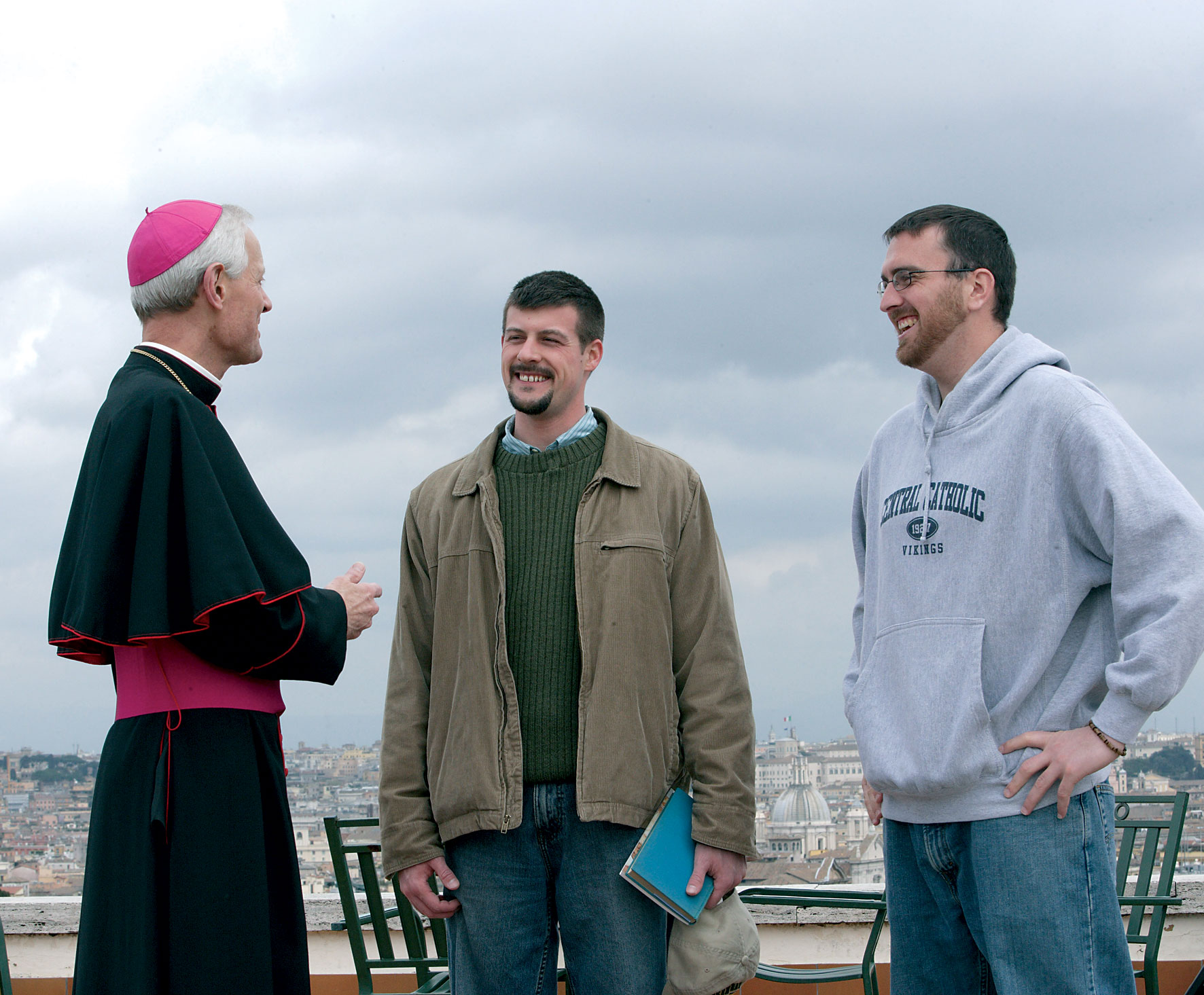
Cardinal Donald Wuerl, archbishop of Washington, with young seminarians at the Pontifical North American College, on the Janiculum Hill in Rome (Galazka photos)
How could you explain the expression “new evangelization” from a pastoral perspective?
Wuerl: The new evangelization. I think the word that for me best explains it is what Pope Benedict XVI said when he announced the formation of the new Pontifical Council for the New Evangelization. He said we have to learn to re-propose. We don’t re-invent, we don’t re-create, because the Gospel’s message has already been proclaimed. Jesus came and told us we must love God and our neighbor. That message somehow over the years and particularly in our culture, that message for many people has somehow lost its savor, it’s lost its power. It doesn’t touch the heart. The new evangelization is to re-propose to people. To listen again to the Gospel, to hear again, maybe to hear for the first time properly. What is it that Jesus came to offer us? What is it that the Church provides us today? A way to live in continuity with the Apostles and with the Gospel. The re-proposing is not a new message. It is the same message, but now new in the way we present it. New in how we engage people to hear it.
All the modern means of communication today are in this position. We used to rely on the Catechism, we used to rely on church bulletins to get the word out. And now we have Youtube, we have Facebook, we have Twitter, we have blogs, we have all these electronic means. The new evangelization will use those means to tell the same story.
How do you see this “re-proposing” through the new media?
Wuerl: There are two things. One is to make sure that you have the message straight, correct and right. Because you have the message and you have a packaging of the message and then you have delivery of the message. Those are the three elements.
To make sure you have the message right, the Pope said go back and reflect on the Second Vatican Council. But this time reflect on it in a hermeneutic of continuity. Reflect on it as this is the truth that comes to us from the Apostles, that in the Second Vatican Council the bishops reflected on it in terms of how do we apply that to the issues of today. Make sure you have the right message.
Secondly, how is it packaged? We have to be able to speak the message in the language of people of today. Often in the communications office of my archdiocese, they tell me that I speak in paragraphs, that I speak in syllogisms: major, minor and conclusion. And they say today people just want sound-bites. You have to learn to speak differently.
So, there is a message, the packaging and delivery. We have to deliver the message with all the mechanisms that the young people are using today. They are not necessarily turning to our archdiocese’s newspaper, but they are turning to our blog. They are turning to our webpage. So, the task includes how you articulate the message and what means you use to get it to the people you wish to reach.
What are your hopes for the Year of Faith?
Wuerl: I think that the Year of Faith is about all we are talking about.
It’s an opportunity to go back and look at what the Council said and how well we implemented that. It’s an opportunity to renew in our hearts the faith, our conviction, in the Gospel. And an opportunity to invite others to share with us the mystery of God’s love and the call to discipleship. The Year of Faith will be a time to concentrate on the things that we already talked about and to remind us that the new evangelization is going to continue well into the future. The Year of Faith is opening the door onto the future.

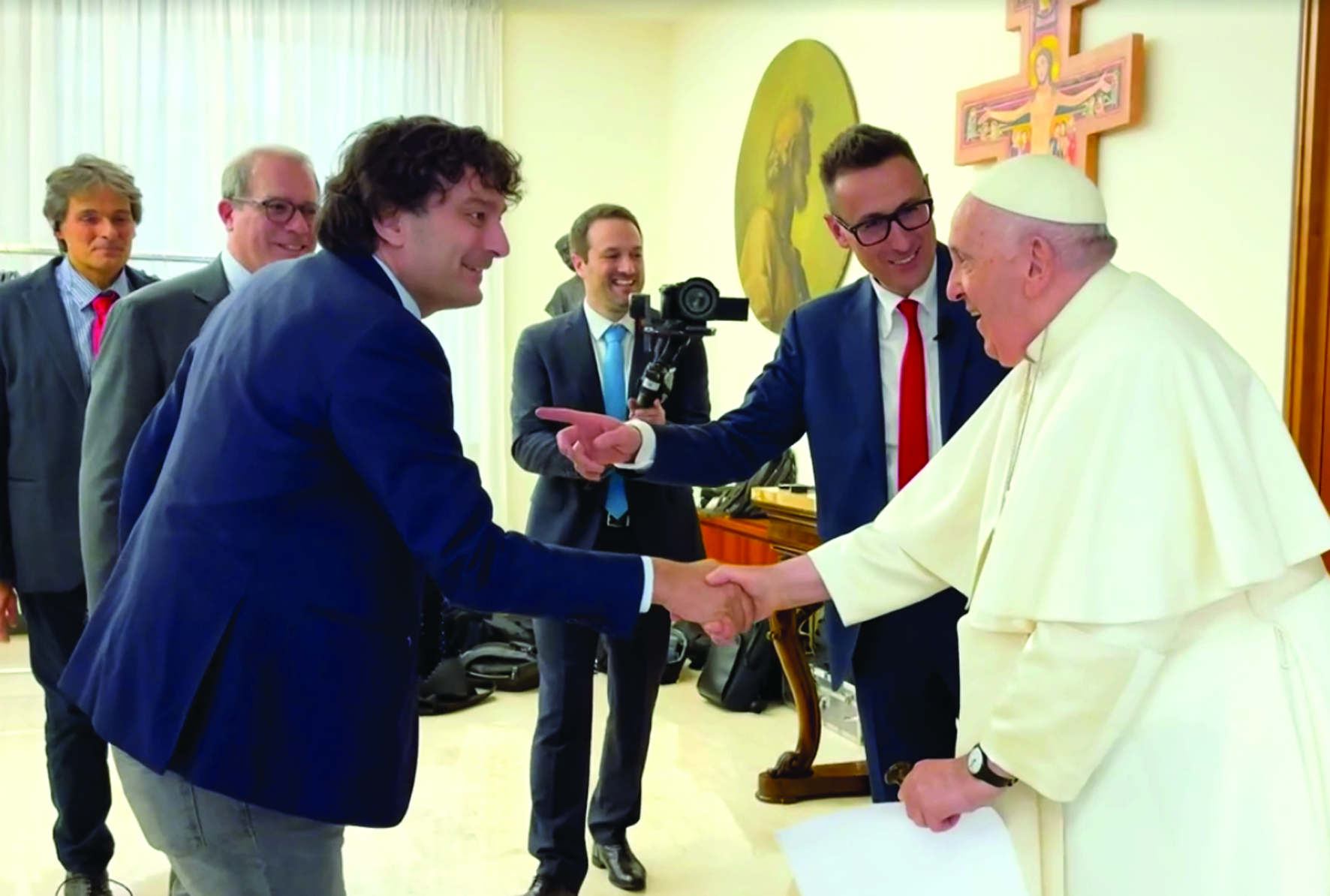
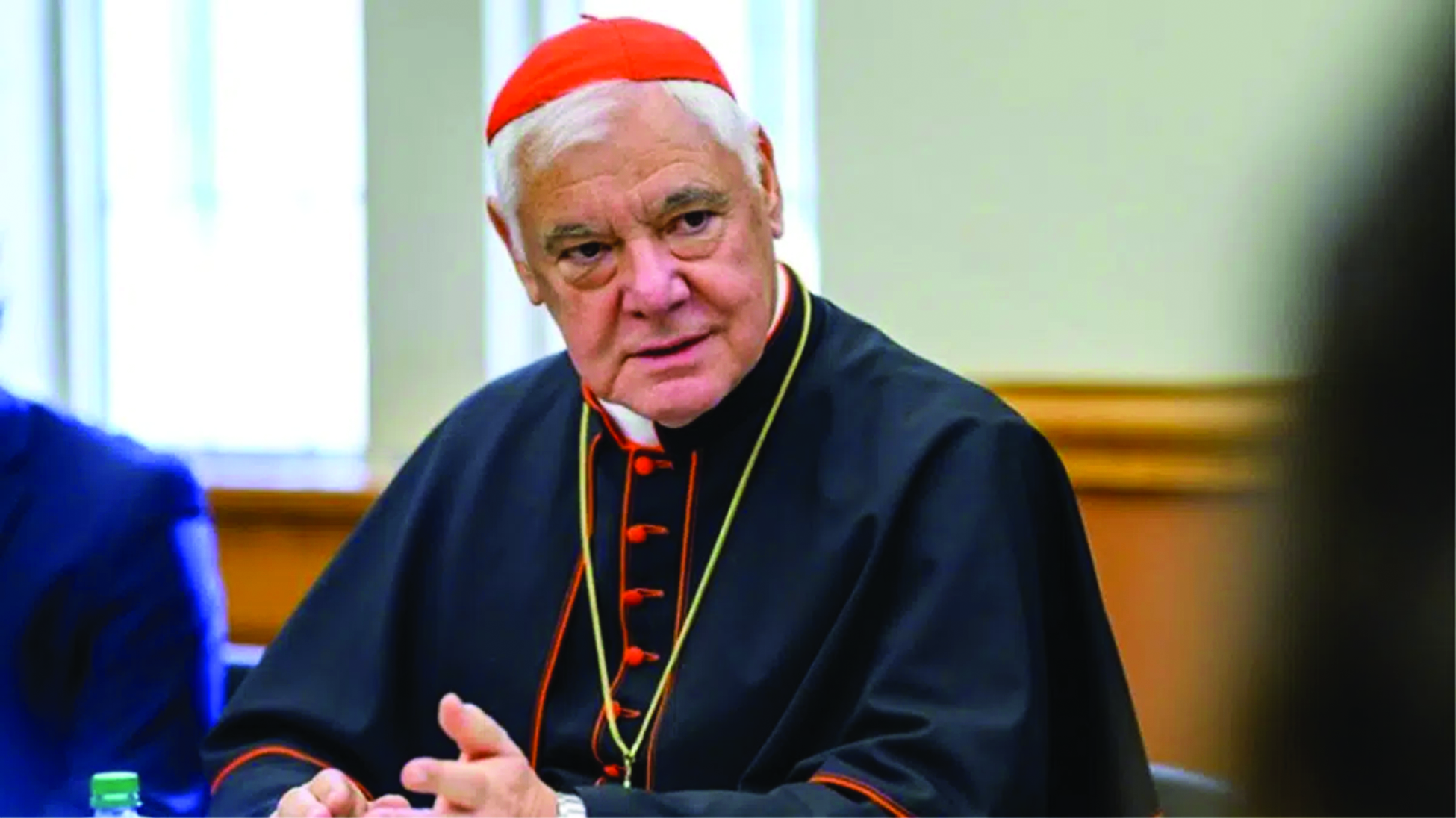
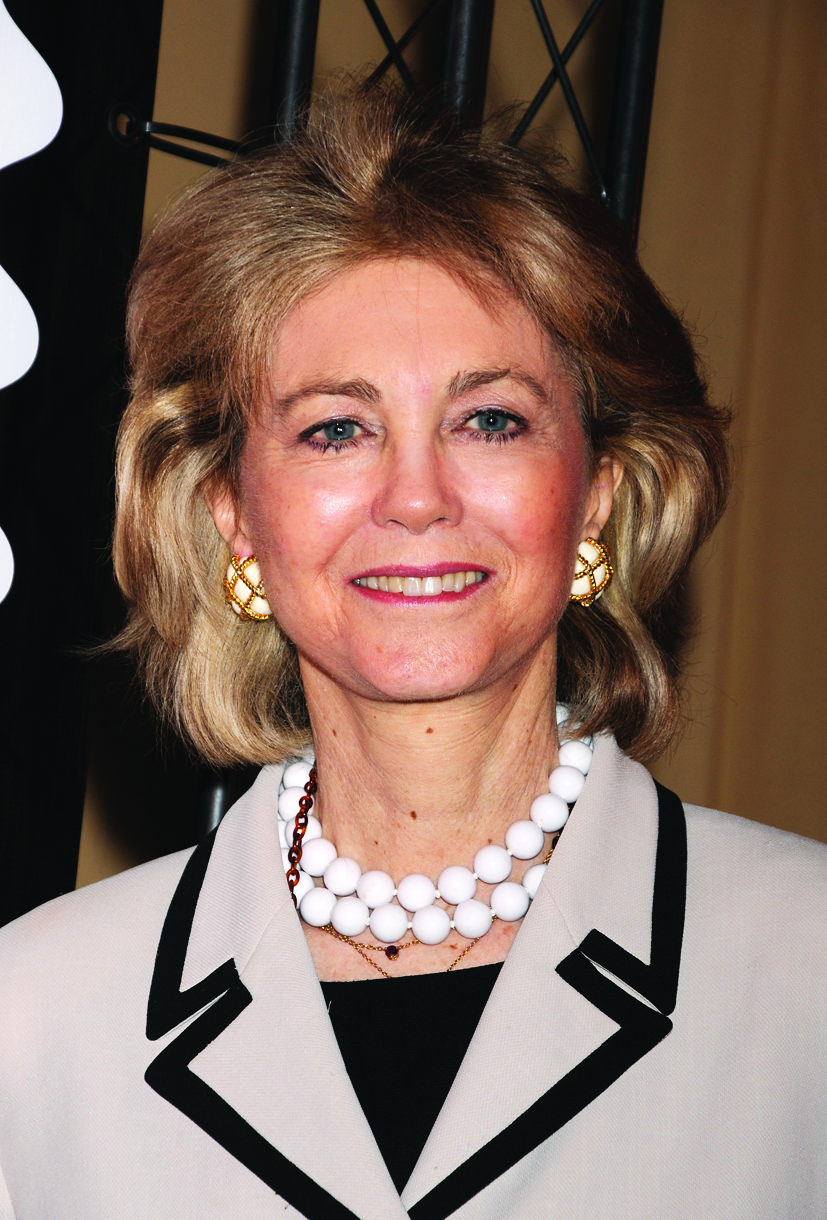
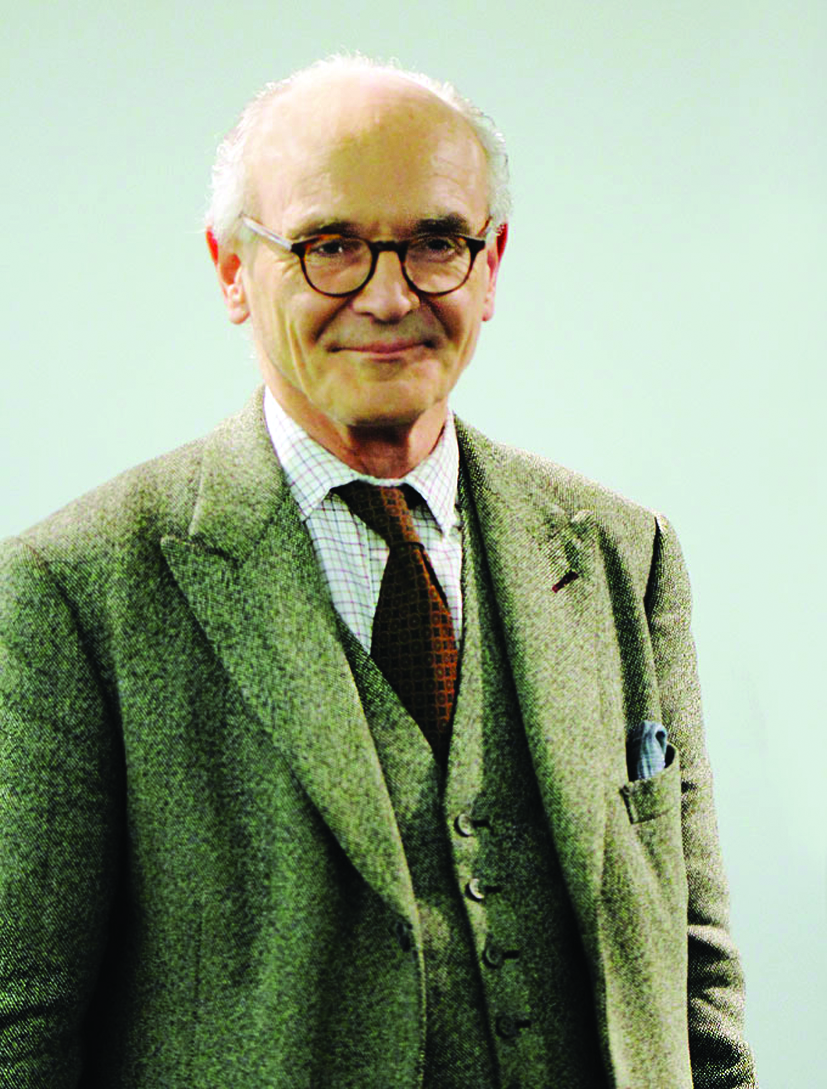
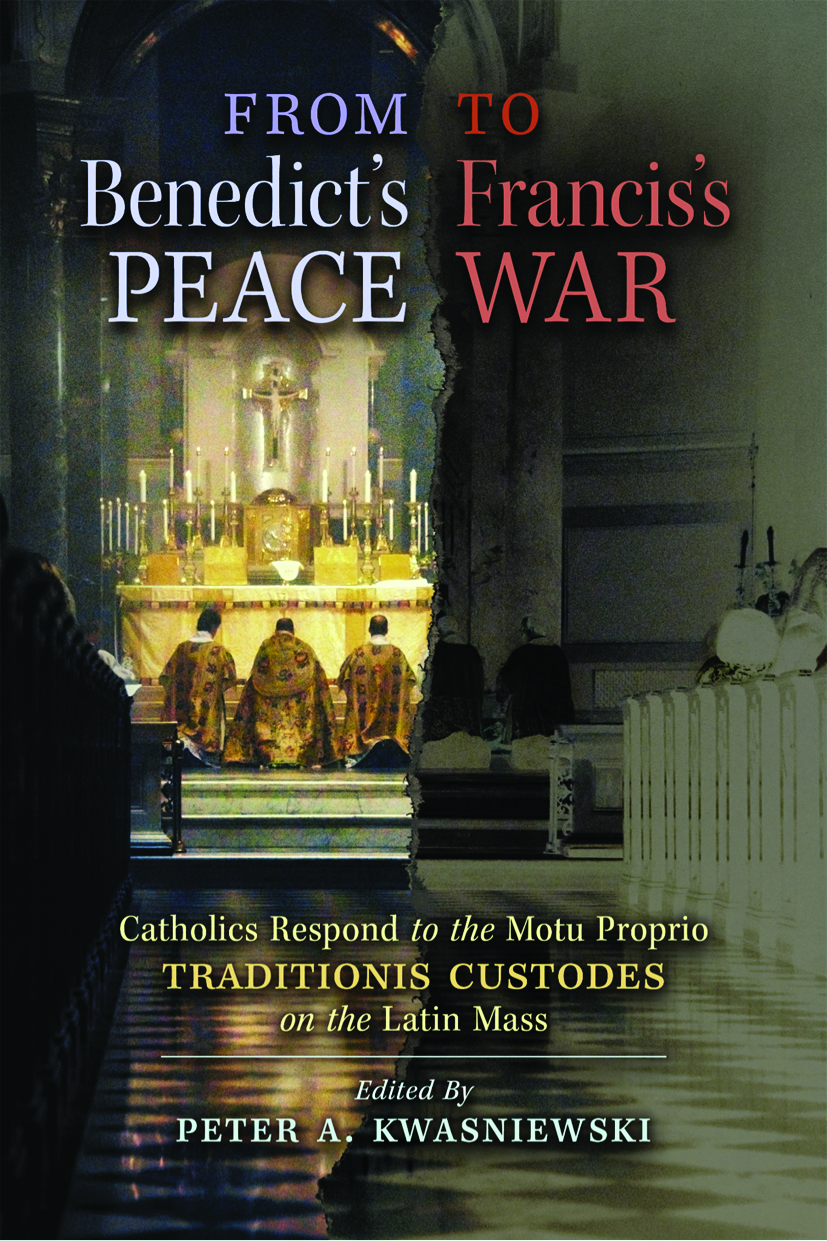
Facebook Comments